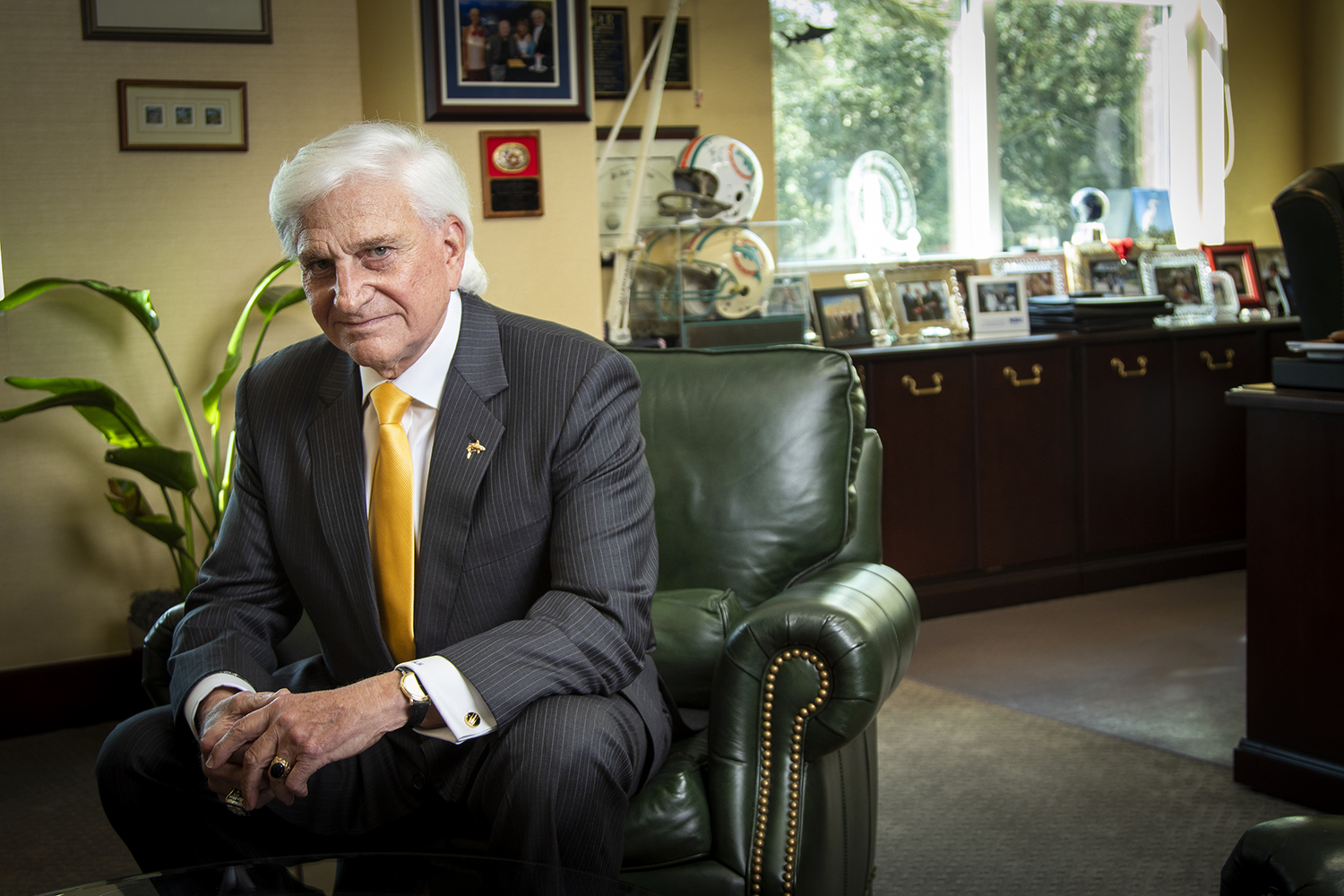[vc_row css_animation=”” row_type=”row” use_row_as_full_screen_section=”no” type=”full_width” angled_section=”no” text_align=”left” background_image_as_pattern=”without_pattern”][vc_column width=”2/3″][vc_column_text]
Portrait Photography by Eduardo Schneider
Either of George L. Hanbury’s two careers would be considered remarkable achievements. For 30 years, he was a city manager, where tenures are often short-lived amid the volatility in local politics. He started as an assistant manager in Norfolk, in his native state of Virginia, and worked in Portsmouth and Virginia Beach before serving as city manager in Fort Lauderdale.
e then became executive vice president and chief operating office at Nova Southeastern University for 12 years and was elevated to president and CEO in 2011, giving him 21 years as a top leader in academia.
Hanbury’s measured cadence of speech is that of a Southern gentleman. He is a big fan of Southern writers and Thomas Jefferson. He’s typically addressed as “Dr. Hanbury,” reflecting his doctoral degree in public administration from Florida Atlantic University.
During a 90-minute interview, there were plenty of interesting nuggets, including the accelerating level of research at the university, an opportunity for international growth and an expansion that could make NSU the biggest source of new doctors in the nation.
This interview has been edited for brevity, clarity and continuity.
Many universities are experiencing declining enrollment, but NSU welcomed its largest freshman class this year, 1,900 students, and has doubled the number of undergraduates in five years. Plus, student SAT scores are up 75 points from a few years ago. How have you been able to accomplish this and what are some of the other approaches?
Well, we became more selective. Our No. 1 undergraduate program is biology. It used to be business. We offer in just about every graduate and professional programs, something called dual admissions. It’s for a bright young student that comes here and wishes to become a physician or a dentist or a lawyer or even an MBA or an education masters. Twenty percent of graduates are in dual admission. We do favor NSU graduates who are competitive to be in our programs. It’s not just physicians, but physician assistants, nurse practitioners, physical therapists, occupational therapy, anesthesiology—all types of programs that are in the health professions. We are predominantly graduate and professional—of about 23,000 students, 6,000 are undergrads and 17,000 graduate and professional students. Our undergraduate program has grown so rapidly because we became more and more selective, requiring our undergraduates who are admitted to be able to not only meet the rigorous demands academically for four years of undergrad, but also have the capability after four years to be able to meet the very rigorous demands of the graduate and professional programs that we have.
All of our programs, whether they are law, or business or education, have a spin. For instance, we have an MBA in complex health care systems. So, we have many top administrators of hospitals throughout the state who are in our MBA program in complex health care systems. We have both the medical school and the business school collaborating together to create a degree like that, or bioinformatics in our engineering and computer science area. So, what we have seen is that in all of our graduate programs, we have practically 100 percent of our graduates getting gainful employment. As such, we have probably one of the lowest default rates [on student loans] in the state and definitely in the nation. We are less than a 3 percent default rate. We have something that we call the Fischler Academy (a teacher preparatory program). We have a four-year master’s program. During the four years in which they are here, they not only get their master’s in education in one of the STEM [science, technology, engineering and mathematics] programs, but we’ve signed agreements with multiple school districts throughout the state, as well as the archdiocese, that they come here and from their first year they will have experience within the educational system. By the time they graduate, they’ll not only have their master’s degree in a STEM program, but a guaranteed job in one of the school districts in South Florida.
In our business school, for our undergraduates, we encourage entrepreneurship and upon their study as they create their business, we will give them $20,000 as some type of seed money in an effort to create and start their own business. That would be in the three-plus-one MBA [program].
We have about 152 academic programs, and only 50 of them are undergrad. In every one of those, with this new NSU Broward Innovation Center, we will inculcate the innovation aspects of scale-up businesses in every of our disciplines.
Since Broward County is paying $5 million, the university’s matching $5 million and we will raise $10 million from the private sector, we’ll have a $20 million Innovation Center. That will be the Greater Fort Lauderdale Alliance’s venue to attract venture capitalists to come and hear pitches for scale-up businesses and also when they are touring industry and business and high tech and biotech to come to Broward County. We will be collaborating with all of the 44 incubator programs that the county has and the innovation center that Broward College has or any of the other universities in South Florida to use this innovation center, not just for startups, but more importantly for scale-up businesses that are seeking, “How do I get that next step from being a small business into a very competitive, commercialized operation.” To have our students be able to rub elbows with the private sector and entrepreneurs and mentors will be invaluable and, I think, will not only help to attract high-tech and biotech businesses to come to Broward County, but also attract some students who wish to have some exposure to that type of an atmosphere. That whole library fifth floor, 33,000 square foot, plus the entire 315,000 square foot library is the only library in the state of Florida where everything in there, from our computer labs, to our circulation to databases, is open free and unencumbered to the general public. You go to any of the university, private or state supported institutions, you’ve got to be a student or a faculty member to be able to use a library card. But, because Broward County’s participated in the construction of that, it is free and unencumbered to the general public
Talk about the concept of the “academical village” that’s being built along University Drive.
In 1819, Thomas Jefferson established the University of Virginia and it was the first college in the nation that was not based on theology. All of the other universities prior to 1819, like Harvard or Yale, had some faith base. He wanted a university that was not faith-based, but that taught theory and practice together. So, he called it his academical village. What we’re building is a 21st-century academical village. The “theory” being the not-for-profit and the “practice” being the for-profit, like the hospital, the hotel, the retail, the research office, and all of that coming together to create a true theory practice. Jefferson felt that without the practice, the theory was no more than an academic exercise. But without academia, the practice became stagnant.
What fact about NSU do you think would most surprise SFBW’s readers?
They probably don’t realize we have 5 million square feet for classrooms and laboratories and that we are predominantly graduate. We are a doctoral research university. We’re the only university that has both D.O. and M.D. (osteopathic medicine and allopathic medicine) in the state and that we have seven regional campuses from Jacksonville; Orlando; Tampa; Palm Beach; San Juan, Puerto Rico; and Miami. We are almost a $1.6 billion balance sheet. We are close to a $4 billion economic impact in the state. With the development of the academical village, we will be close to a $7 billion economic impact from the hospital, to the hotel to the residential, retail and office buildings that will be built there—all integrated in a doctoral research university.
You are really having dramatic growth in educating doctors.
What we have is 250 D.O. students on this campus and then through the generosity and philanthropy of Dr. Kiran C. Patel, we’re expanding over into Tampa Bay. He built us a 311,000-square-foot center, the size of the library, on 27 acres right on Tampa Bay, where we will also have 150 new D.O. students. We have 50 M.D. students that will expand after full accreditation to 125. So, we got 150 over in Tampa Bay and today 250 on this campus (D.O.s and M.D.s). So that’s 400 and another 125. That’s 525 physicians a year that will be receiving their degrees. I don’t know of any other university in the nation that awards that many degrees to physicians.
On your way out, go down 39th Street or 36th Street and on the corner of University, you’ll see a 200-bed hospital and a medical office building that HCA is building. We are out now with Jones Lang LaSalle for a hotel conference center to be built that would really team up with our research center for collaborative research, which is one of the largest research facilities, pure wet labs, in the state for clinical trials. I’d like to see this whole area become a destination for the health care sciences. The area over there, where we’re tearing down the old University Park Plaza is for-profit. They pay taxes. That’s the practice. Our not-for-profit, which is the rest of the 300 acres, is the theory. So you see why I’m calling it a 21st century academical village with technology of the 21st century. Plus, we own 250 acres across the street for future expansion, which is known as Grande Oaks, a golf course.
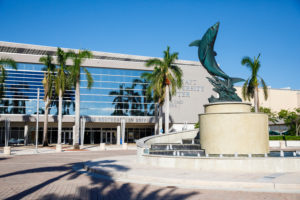
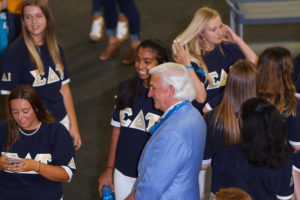
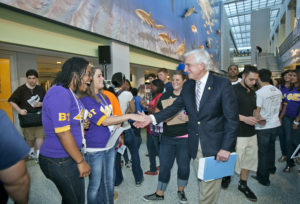
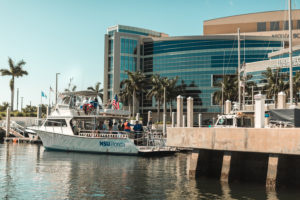
What else would you like to see as part of the academical village?
I would love to see some high-tech software offices and research to kind of complement the Innovation Center. I think our engineering and computing programs, which are really master’s and doctoral programs, would help to attract those types of businesses. So not only health-related, but tech-related.
Are you at the point now where they could actually come here and find some acreage to put up a building?
Absolutely,
I seem to remember you also have a lot of student diversity.
We are a minority-majority university. We are right at 30 percent Hispanic or Latino. We’re about 30 percent African American or black, 30 percent Anglo, and Asian is about 10 percent and growing, especially Indian Asian with the one of our major benefactors being Dr. Patel. I just came back from India with Dr. Patel and signed a memorandum of understanding with an engineering college. They get their undergraduate there, but they don’t have graduate programs in engineering and computing. So, for this MOU, 25 students coming from Gujarat, which is the state where Gandhi was from in India, will be coming here every year to get their master’s or doctoral degrees in in computing and engineering. Dr. Patel has built two hospitals in India as well as a school, and he wishes to expand our osteopathic medicine into India and grow NSU to be global, not just in the seven areas of the state. By the way, without our regional campuses, we could not offer all of the health profession programs that we offer. Every one of the health professions, whether it’s nursing, physical therapy, occupational therapy, medicine, dentistry, pharmacy, require clinical opportunities in a medical facility. By going into Jacksonville; Orlando; Fort Myers; Tampa Bay; Miami; [and] San Juan, Puerto Rico, we’re able to spread out, so that those students can meet the needs in those areas.
How strong is the university financially?
Moody’s and Standard & Poor’s have been writing that education of the future ought to be like Nova Southeastern University, which is preaching and practicing beyond four years of college because without that, that’s what people are saying is a waste today and you’re not getting your money’s worth. We’ve just increased our bond rating from Moody’s from Triple B-plus to A, and a lot of universities today have a negative outlook. We’re ranked positive with Moody’s, Standard & Poor’s and Fitch. Fitch just put us up to A. Standard and Poor’s is getting ready to make an announcement and Moody’s made us positive, so it’s been good because we’re diversified.
Talk about your sports programs, and will you add football with the Miami Dolphins moving their training facility?
No, but maybe lacrosse. Athletic programs are by the size of your undergraduate program. So we’re the largest Division II school that I’m aware of in the nation, with 23,000 students, but 6,000 undergrads. We’ve won some major national champions in baseball, in golf (both men and women) and rowing.
With the Dolphins moving out in 2021, I want to consolidate. We have 33 separate clinics here with multiple different topics, from dentistry to psychology to medicine to sports medicine. I want to put them all under the umbrella of NSU Health and located it into and remodel the Dolphins training facility. When the Dolphins move out, the football fields and the bleachers will be ours. A lot of people think, well, does that mean you’re going to have football? No, but it could mean we’ll have a wonderful lacrosse field and some beautiful soccer fields. We’ve already got men and women’s soccer. Football is an expensive sport. We do emphasize student-athletes. Our students have over a 3.3 average for the almost 10 years since we’ve been in the Sunshine State Conference. Football, because we are about 70 percent female and with Title IX [equity laws], if I put 100 men on the field for football, I’d have to have almost 300 more females in sports or I’d have to do away with other male sports. And then to equip football, it’s the most expensive equipment program. We could spend as much as $10 million on football. We spend $10 million on 375 athletes. We have 11 female sport and six male sports, because we’re 70 percent female.
Tell us about some of the university’s research efforts.
The vastness of the research is just mind boggling. We have a professor researcher who developed an epipill, which is being tested right now, which is basically the same things as an EpiPen, but it’s a sublingual dissolving tablet that is actually quicker and more effective and easier to carry around. We’ve gotten some royalties on that. A French company purchased the patent and we’re getting royalties.
We have the Karolinska Institutet, which is Swedish. They award the Nobel Peace Prize. They are doing research in stem cell here with our researchers, so we do collaboration with Karolinska. We also have a vivarium with mice and rats on the top floor where we need to do research with animals, small animals and that’s in cancer research. Matter of fact, Dr. Appu Rathinavelu [executive director of NSU’s Rumbaugh-Goodwin Institute for Cancer Research] just got a benchmark for brain tumors for children. He just got a patent and the patent got biomarked and was recognized.
We’re doing great research in oceanography and also some very secretive work for the Defense Department in oceanography and underwater currents and controls, and transmissions of signals and things of that nature as well as preservation of the reef and growth of coral and studies of marine animals and sharks. Mahmood Shivji [director of NSU’s Save Our Seas Foundation Shark Research Center and Guy Harvey Research Institute] has just broken down the DNA of white sharks. We are seeing what we can do to bridge it over into human genomic aspects. Saving the sharks could save humanity. We’re doing research in Panama, with Guy on billfish and on the migration north from Antartica of the whales right there in Panama. We’re doing research on pelagic fish [they live neither close to the bottom or near the shore], and what are the migration patterns so that we can conserve? Most of the fish as you go up are mature fish. So where are they spawning? And how are they developing? And why do they come to that area? I want to bridge that research and we’ve got two research facilities, The Center for Collaborative Research, which is $100 million, the oceanographic one is $50 million. So, NSU, a private not-for-profit, has invested $150 million in pure research and we’ve got room to attract a lot of researchers to both places. I’ve got a vacant floor at oceanography. I’ve got 2½ vacant floors in the center for collaborative research.
What haven’t we covered?
We are not only a doctoral research university, but we also give back to the community. Community is one of our core values. There are about 3,000 four-year colleges in the country, and we are recognized by the Carnegie Foundation as a national doctoral research university and there are about 400 of those. We want to see ourselves by 2025 be in the top one-third. We just got ranked by U.S. News and World Report two years ago in the top 200 universities, and I want to see us in the top 100-some universities by 2025. I think the key thing that we have that will put us on edge, is our emphasis in the health professions and giving back to the community. Carnegie has a designation of a national doctoral research university and they also have a designation of universities that are community-engaged. Of those doctoral research universities, there are only 37 of us that have both dual recognition. I think that’s something really to be proud of,
When you were a city manager, did you ever think you would end up in your current role?
Even when I was city manager, I was always trying to teach. While I was in Fort Lauderdale, I went to night school at FAU. FAU had a Ph.D. program in public administration in downtown Fort Lauderdale and it took me 6½ years. Thank goodness I was in Fort Lauderdale eight years. So, I had just finished my doctoral work and I knew it was time for me to leave. Ray Ferrero Jr. had just become the president of NSU and he said, “George, you know, for 38 years, I’ve been a practitioner of law, but I’ve never really had to bring disparate groups together and get something done, like technology, finance, public safety, academic programs, the deans, the vice president, bring them all together and that’s kind of what a city manager does.” So, he saw the university like a city and to some degree it is. I came here and I was his chief operating officer for 13 years, I also gained a faculty position over in the business school because I did have a doctorate and I teach public administration, economics, finance and leadership. And then after 13 years, when Ray stepped down, the trustees said, we’ve been interviewing you for 13 years, we would like for you to succeed Ray and I’m going on my ninth year as president. What I’ve been doing here is probably the most noble thing I think ever done. To be able to sit at the table and help to create the values of young men and women on what they are going to do in the future, it really is quite heartwarming for me. ♦
[/vc_column_text][/vc_column][vc_column width=”1/3″][/vc_column][/vc_row]


